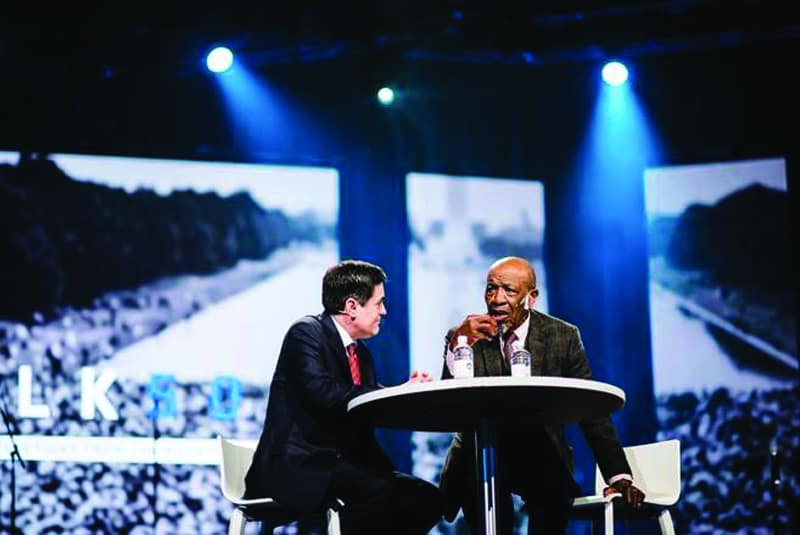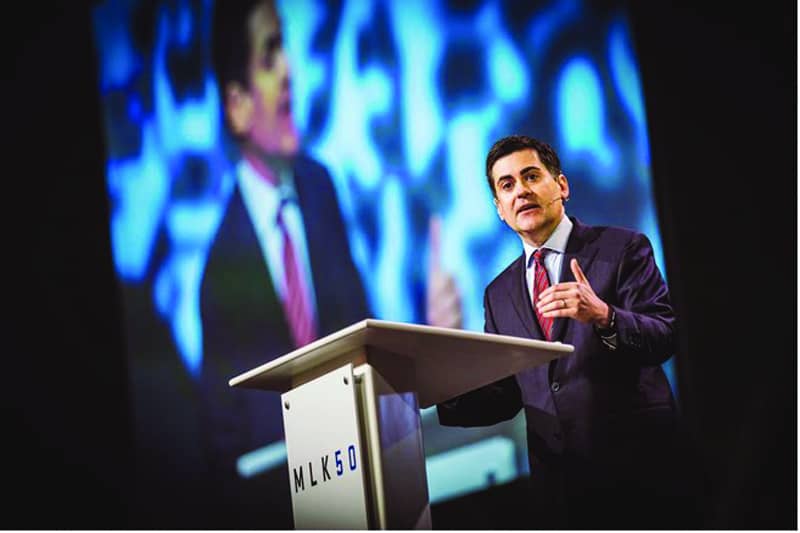By Staff, Baptist Message
MEMPHIS, (LBM) –The Ethics and Religious Liberty Commission of the Southern Baptist Convention partnered with The Gospel Coalition, a fellowship of evangelical churches in the Reformed tradition, to host a tribute to Martin Luther King, Jr., in Memphis on the 50th anniversary of his death.
Russell Moore, president of the ERLC and a member of TGC Council, headlined a diverse group April 3-4 that included noted author and Bible teacher Beth Moore as well as civil rights activist John Perkins and spoken word artist Jackie Hill-Perry among the 75 or so personalities who gave keynote remarks, led panel discussions or gave brief talks.
Leading up to the event, Moore released a statement explaining the need for the conference in terms of a sense of urgency to remind “the conscience of the church” to pursue racial unity in the midst of tremendous tension.
“Fifty years after Dr. King’s assassination, it is shameful that the church often lags behind the culture around us when it comes to issues of racial justice, unity and reconciliation,” Moore said. “We should be leading the way.”
The two-day conference included laments; calls to repent, to pay the price for unity, for racial diversity in the Southern Baptist Convention; and, even the unveiling of a “hymn” by The Village Church in the Dallas-Fort Worth area repudiating “broken systems” and “microagressions” that perpetuate notions of racial inferiority about minorities.
Baptist Press provided extensive coverage of the event, including the following excerpts from their reports:
CALL TO REPENT
Moore began the ERLC, TGC co-sponsored event with a lament.
Many evangelicals of King’s day, he said, embraced segregation. And in doing so, they betrayed Jesus’ teaching.
“Time and time again in the white American Bible Belt,” he said, “the people of God had to choose between Jesus Christ and Jim Crow—because you cannot serve both. And tragically many often chose to serve Jim Crow and rename him Jesus Christ.”
Today, Moore said, many Christians still are more formed by the culture than by the Bible. Churches remain segregated and divided. And Christians still fail to live up to Jesus’ teaching.
That has to change, he says.
“The answer is not to rebrand but to repent,” he said.
LAMENTS
Matt Chandler, lead teaching pastor of The Village Church [and president of Acts 29, a Calvinist church-planting network], asked for the Holy Spirit to “break our hearts for our blindness and our hard-heartedness and our foolishness.”
“Will You allow Your church to see the pitiful state of things so that we might repent … [with] the kind of gut-level heart-brokenness that understands that we have made a mess and only You will be able to clean up that mess?” he said.
Moore acknowledged in his prayer that many at the conference are members of Christian denominations that were formed in defense of slavery.
“Father, Lord, would you have mercy on us, sinners?” Moore prayed. “Lord, would you give us a sense of broken-heartedness, a sense of lament, a sense of repentance, but not the sort of repentance that leads only to despair, [but] the sort of lament and the sort of repentance that causes us to cry out, Abba Father?”
Collin Hansen, TGC’s editorial director, prayed, “Oh Lord, in this country, we have gone astray. Fellow white Americans and I have turned to our own self-interests.
“Plead for us, Lord Jesus, transgressors against Your will, transgressors so often against brothers and sisters of color,” he requested. “Lord Jesus, heal our strife-stricken land, these United States of America. Let justice begin with the household of God, and let a revival of justice and mercy begin with the household of God.”
A PRICE FOR UNITY
Veteran pastor Crawford Loritts, an African American pastor of a predominantly white church, said on the final panel of the conference the question is not so much, “Where do we go from here?” but “Why haven’t we gone from here?”
The need is courage, he said. “This issue is going to cost us.
“Are we willing to pay that price? Love is expensive, and commitment is expensive.
“And I think God is standing back and saying to the church: You all know what to do here. You really do know what to do,” said Loritts, senior pastor of Fellowship Bible Church in Roswell, Ga. “It’s the courage and will to do it and to be it and to pay that price.”
Chandler and other speakers pointed to the need for cross-ethnic relationships — and not ones in which white Christians find African Americans who agree with them.
[H]e has a group of black fellow pastors who provide a “voice that I need to hear because I do not know or understand,” Chandler said. “If it weren’t for the ‘hanging-in-there-ness’ of my African American brothers and sisters, there would be no way forward for us as a white congregation.”
… Ignorance of history and the system is a problem for many white evangelicals, Chandler said in seeking to explain their inconsistencies on race issues.
“[T]hey don’t know what they don’t know, and they are part of a system that encourages their not knowing,” he said. “This ignorance has led to immaturity, and [immaturity] talks when it should listen, and it’s silent when it should speak. This immaturity has led either to hostility or withdrawal.”
Another problem is the slippery definition of “evangelical,” said TGC President Don Carson.
There are “millions of people who call themselves evangelicals who have never been born again; never really, truly trusted Christ; who don’t bow to the Lordship of Christ,” Carson said during the final panel discussion. “The statistical evidence for that is overwhelming.”

Longtime civil rights leader John Perkins talks about racial reconciliation during an interview with Russell Moore at the MLK50 conference Tuesday (April 3) in Memphis.
SBC SHOULD REFLECT DIVERSITY
Byron Day – president of the National African American Fellowship (NAAF) of the SBC and senior pastor of Emmanuel Baptist Church in Laurel, Md. — said the [SBC’s] 1995 resolution [repenting of past racism and asking forgiveness from African Americans] “was great. It was wonderful. But what are you going to do with it?
“At every level, we need to see the diversity of our convention,” he told the breakout session audience. “And there needs to be accountability.” Regarding accountability, Day said the reports from the SBC’s entities need to provide more detail on their diversity efforts.
Kevin Smith, executive director of the Baptist Convention of Maryland/Delaware, said, “I would love to continue to press past the 1995 resolution.”
The SBC’s committees and boards need to reflect the broad diversity of the convention, including Hispanics and Asians, said Smith, an African American. The diversity should include positions that make budget and hiring decisions, he said.
One of the messages he hears, Day said, is: “It’s time to stop talking and start doing.”
Vance Pitman, senior pastor of Hope Church in Las Vegas, Nev., told the audience “an apology one time does not in any way undo the tragedy of what was done.”
“Sometimes white Southern Baptists say, ‘Okay, we made our apology. Can we not move past that?’” Pitman said. “It’s a gross misunderstanding of the severity of the issue that took place, and I think for that reason white Southern Baptists should be the kind of Southern Baptists that every time there’s an opportunity to drive a nail into the coffin of racism every white Southern Baptist should be very quick to grab the hammer.
REACTION
Thabiti Anyabwile, a pastor at Anascotia River Church in southeast Washington, D.C., and a fellow TGC Council member with Russell Moore, expressed personal conflicts about the “celebration” of the fiftieth anniversary of the assassination of Dr. King, posting an editorial April 4 on the official TGC website.
Anyabwile offered that “it’s struck me as perversely curious to ‘celebrate the fiftieth anniversary’ as some put it,” he said, adding that King “did not die peacefully in his sleep” but was murdered “violently and cruelly from the bullet fired from the .30-06 Remington Model 760, a bullet tearing through his cheek, breaking his jaw and vertebrae as it rifled through his spine.
Moreover, Anyabwile went further to state that the U.S. society was complicit with James Earl Ray in King’s murder.
“I’m saying the entire society killed Dr. King,” he said.
“I don’t need all white people to feel guilty about the 1950s and 60s—especially those who weren’t even alive,” Anyabwile offered. “But I do need all of us to suspect that sin isn’t done working its way through society.
“Until this country and the Church learns to confess its particular sins particularly, we will not overcome the Adamic hostility that infects the human soul and distorts human potential,” he said.
“My white neighbors and Christian brethren can start by at least saying their parents and grandparents and this country are complicit in murdering a man who only preached love and justice.
“If we’re serious, then we can go on to commit ourselves to laying down our lives for others as Dr. King did. After all, the King of Kings said, “Greater love has no one than this, that someone lay down his life for his friends” (John 15:13).




